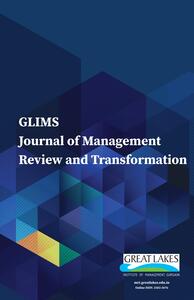
1 Department of Psychology, Christ (deemed to be) University, Bengaluru, Karnataka, India
Creative Commons Non Commercial CC BY-NC: This article is distributed under the terms of the Creative Commons Attribution-NonCommercial 4.0 License (http://www.creativecommons.org/licenses/by-nc/4.0/) which permits non-Commercial use, reproduction and distribution of the work without further permission provided the original work is attributed.
Humans’ abject failure to uphold moral behaviour within workplace relationship calls for ongoing investigation of the complicated challenges brought on by the imbalance between productivity and commitment among employees. This current article is based on studying the gender differences in ethical decision-making among sales professionals in India and understanding under what circumstances the decision-making among the genders differ. The major findings show that no such decision-making difference between males and females exists. The research was conducted with a sample size of 10, but the data saturated at eight participants, wherein four were males and four were females. It is a qualitative study, and still, factors like incentives (money) and the experience level tend to deflect the ethical decisions of the individuals.
Ethics, gender differences, sales, rewards, India
Basu, S. (2022, 8 February). More women in India taking up leadership roles but boardroom diversity progress is slow: Report. The Economic Times. https://economictimes.indiatimes.com/news/company/corporate-trends/more-women-
Beltramini, R. F., Peterson, R. A., & Kozmetsky, G. (1984). Concerns of college students regarding business ethics. Journal of Business Ethics, 3(3), 195–200. https://doi.org/10.1007/bf00382919
Betz, M., O’Connell, L., & Shepard, J. M. (1989). Gender differences in proclivity for unethical behavior. Journal of Business Ethics, 8(5), 321–324. https://doi.org/10.1007/bf00381722
Carson, T. (2001). Deception and withholding information in sales. Business Ethics Quarterly, 11(2), 275–306. https://doi.org/10.2307/3857750
Dawson, L. M. (1995). Women and men, morality and ethics. Business Horizons, 38(4), 61–68. https://doi.org/10.1016/0007-6813(95)90010-1
Doan, T., & Iskandar-Datta, M. (2020). Are female top executives more risk-averse or more ethical? Evidence from corporate cash holdings policy. Journal of Empirical Finance, 55, 161–176. https://doi.org/10.1016/j.jempfin.2019.11.005
ETHRWorld. (2021, 30 November). Women in leadership roles: A glimpse into the current scenario. ETHRWorld.Com. https://hr.economictimes.indiatimes.com/news/trends/leadership/women-
Ferrell, O. C., & Gresham, L. G. (1985). A contingency framework for understanding ethical decision making in marketing. Journal of Marketing, 49(3), 87. https://doi.org/10.2307/1251618
Franke, G. R., Crown, D. F., & Spake, D. F. (1997). Gender differences in ethical perceptions of business practices: A social role theory perspective. Journal of Applied Psychology, 82(6), 920–934. https://doi.org/10.1037/0021-9010.82.6.920
Furnham, A., & Rajamanickam, R. (1992). The protestant work ethic and just world beliefs in Great Britain and India. International Journal of Psychology, 27(6), 401–416. https://doi.org/10.1080/00207599208246905
Grell, J. (1993). Ethics in business may improve ethics in society. On the Horizon, 2, 6.
Heyler, S. G., Armenakis, A. A., Walker, A. G., & Collier, D. Y. (2016). A qualitative study investigating the ethical decision making process: A proposed model. The Leadership Quarterly, 27(5), 788–801. https://doi.org/10.1016/j.leaqua.2016.05.003
Lehnert, K., Craft, J., Singh, N., & Park, Y. H. (2016). The human experience of ethics: A review of a decade of qualitative ethical decision-making research. Business Ethics: A European Review, 25(4), 498–537. https://doi.org/10.1111/beer.12129
Lim, W. M., O’Connor, P., Nair, S., Soleimani, S., & Rasul, T. (2023). A foundational theory of ethical decision-making: The case of marketing professionals. Journal of Business Research, 158, 113579. https://doi.org/10.1016/j.jbusres.2022.113579
Meriac, J. P., Poling, T. L., & Woehr, D. J. (2009). Are there gender differences in work ethic? An examination of the measurement equivalence of the multidimensional work ethic profile. Personality and Individual Differences, 47(3), 209–213. https://doi.org/10.1016/j.paid.2009.03.001
Quierrez, J. I. (2020, August 28). Business ethics: Impact to employee behavior and productivity. International Journal of Disaster Recovery and Business Continuity, 11(2). http://sersc.org/journals/index.php/IJDRBC/article/view/31284
Sanaria, A. D. (2016). A conceptual framework for understanding the impression management strategies used by women in Indian organizations. South Asian Journal of Human Resources Management, 3(1), 25–39. https://doi.org/10.1177/2322093716631118
Serwinek, P. J. (1992). Demographic & related differences in ethical views among small businesses. Journal of Business Ethics, 11(7), 555–566. https://doi.org/10.1007/bf00881448
Shen, W., & Joseph, D. L. (2021). Gender and leadership: A criterion-focused review and research agenda. Human Resource Management Review, 31(2), 100765. https://doi.org/10.1016/j.hrmr.2020.100765
Statista. (2022, March 16). Rate of female labor force participation India 1990–2020. https://www.statista.com/statistics/983020/female-labor-force-participation-rate-india/
Stedham, Y., Yamamura, J. H., & Beekun, R. I. (2007). Gender differences in business ethics: Justice and relativist perspectives. Business Ethics: A European Review, 16(2), 163–174. https://doi.org/10.1111/j.1467-8608.2007.00486.x
Sunanda, K. (2018) Impact of work place ethics on employee and organization productivity. International Journal of Management, 9(1), 22–28. http://iaeme.com/Home/issue/IJM?Volume=9&Issue=1
The World Bank. (2022, 8 February). Labor force participation rate, female (% of female population ages 15+) (modeled ILO estimate)—India | Data. The World Bank. https://data.worldbank.org/indicator/SL.TLF.CACT.FE.ZS?locations=IN
Tsalikis, J., & Ortiz-Buonafina, M. (1990). Ethical beliefs’ differences of males and females. Journal of Business Ethics, 9(6), 509–517.
Walton, C. (1998). The moral manager and decision making. In: R. F. Duska (Ed.), Education, leadership and business ethics (pp. 205–210). Springer. https://doi.org/ 10.1007/978-0-585-27624-3_17